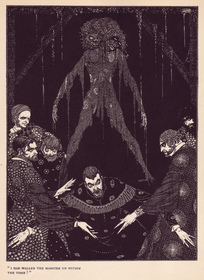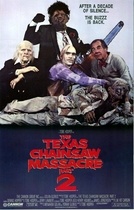Our editor-in-chief Nate Yapp is proud to have contributed to the new book Hidden Horror: A Celebration of 101 Underrated and Overlooked Fright Flicks, edited by Aaron Christensen. Another contributors include Anthony Timpone, B.J. Colangelo, Dave Alexander, Classic-Horror.com's own Robert C. Ring and John W. Bowen. Pick up a copy today from Amazon.com!
Cold Reads: The Black Cat by Edgar Allan Poe
Cold Reads celebrates Writer of the Month! Throughout August, we will be studying the works of Edgar Allan Poe and celebrating his massive contributions to the horror genre.
Throughout the fiction of Edgar Allan Poe, there is a recurring theme of murder and the agonizing guilt that soon follows afterward. "The Tell-Tale Heart" and "The Black Cat" are the exemplary stories of this common theme. I chose "The Black Cat" because I think that almost everyone and their grandmothers have read "The Tell-Tale Heart." I felt that hardly any attention was given to the tale up for this week's review and, having never read it myself, I decided to give it a go. What I discovered was an excellent tale of the supernatural that, while not quite matching the intensity of "Tell-Tale," deserves to be read by any fan of the master.
The story begins much like Poe's others, the following being a paraphrased opening. "Ahh! Hello, dear reader! Would you like to hear a story? What? Me...? Mad, you say? Of course I'm not mad! *Kicks baby seal* Mwahahaha!" Okay maybe that isn't exactly how it starts. But you get the idea.
Our not-so-lovable narrator tells us of how he has loved animals all his life, taking in all sorts of critters into his home. His favorite pet is a lovely black feline named Pluto, a cute little tyke who is always following the narrator around to nuzzle up against his leg. After developing a nasty case of alcoholism, our narrator's attitude starts to sour and he begins abusing his little pets. In a drunken rage, he fashions a noose and hangs poor Pluto from the tree in the garden. Haunted by the doppelganger of his executed kitty and a murder most foul, our protagonist soon learns that there's just no way of silencing the dead...
In "The Black Cat," Poe experiments with the actual font of the story itself, using different formats sparingly but to great effect. In the following examples, Poe puts emphasis on certain words to make their meanings register deeply within the reader and to mark turning points within the plot:
"I married early, and was happy to find in my wife a disposition not uncongenial with my own. Observing my partiality for domestic pets, she lost no opportunity for procuring those of the most agreeable kind. We had birds, gold fish, a fine dog, rabbits, a small monkey, and a cat." Poe utilizes the italics to clue us in on things to come. Even now we can picture that aggressive inflection the narrator puts upon the word, as if he were spitting poison from his mouth. It draws our interest and makes us wonder as to just what might have occurred to change this once admirable man into a loathsome villain. We find out all too soon, as seen in the next quote:
"I had so much of my old heart left, as to be at first grieved by this evident dislike on the part of a creature which had once so loved me. But this feeling soon gave place to irritation. And then came, as if to my final and irrevocable overthrow, the spirit of PERVERSENESS." Poe now trades in the subtlety of the italics and stresses this word in blaring capital letters. As trivial as it might seem, the large letters actually mark a huge turning point in the plot as well as the narrator's character. He has now been overtaken by this mighty entity that he is a slave to, much like how he is a slave to alcohol (a bit of autobiography from Poe's part it seems). These innovative uses of font are little pieces of genius, a tool that most writers seem to neglect in their writing. Poe realizes that there are other ways the printed word can convey the appropriate emotions, and here he uses this knowledge to excellent effect.
Shortly after the above proclamation is made by the narrator, his soul becomes a torrent of rage and fury. He is now a creature completely based on impulse, acting and reacting at the drop of a hat. The character seems to be a chillingly accurate portrait of how a madman would act. His small acts of depravity build steam over time and eventually explode in blind insanity. Fueled by liquor, the narrator first takes out his pent up rage on Pluto, going so far as to remove one of the cat's eyes with a pen knife. He performs the act unflinchingly, deaf to the shrieks of his beloved pet. It's a horrifying scene to imagine, but Poe has our eyes pried open and he's not letting us turn away.
The narrator's bloodthirsty tendencies culminate in the basement scene. When the Pluto replacement nearly causes him to trip down the stairs, the man snatches up an axe to kill the thing he loves yet again. Prevented from doing so by his wife, the man turns on her and gives her a good swing to the cranium. There's no lengthy argument or struggle in between these two sequences. The man's nerves have reached the breaking point and he has become a machine given to impulsive and instantaneous commands. He kills his wife with as much thought as he would have if somebody asked him to pass the butter. When the narrator talks of walling up the corpse as if it were the next obvious course of action, we know that he is completely lost. The events that unfold afterward are wrought only by his own ignorance and perhaps the vengeful hand of Fate.
At this point it might seem like I'm nitpicking, but there was one incident within the story that came out of left field and inspired a little laughter from me on account of how ridiculous it sounded. The narrator's house suddenly burns down to the ground the night of Pluto's execution and the man later returns to the charred ruins. Noticing a crowd, the man observes with horror that they are all standing around an intact fragment of wall that has the ashy outline of a black cat imprinted on it. Overwrought with terror, the narrator rationalizes that during the night of the fire a passer-by had spotted the inferno and, in an attempt to arouse the occupants of the house, removed deceased Pluto from his tree-gallows and threw the animal through the bedroom window. The imprint was made when the kitty corpse banged against the wall and, due to the immense heat, was sealed into the wall!
Uhhhh... what?! Last time I checked roadkill tossing was not the most effective way of alerting people of danger and I'm pretty sure it's illegal in a few states. I don't think you'll ever catch me yelling "Oh my god! Jimmy's trapped in a well! Quick, somebody get me a dead animal!" After my crazy laughter subsided, I began to rationalize the scene myself. It seemed to me that perhaps the purpose for this insane logic was to show the reader just how desperate the narrator had become to come up with a reasonable (however half-assed it may be) notion for the phenomena with the wall. It pushes him closer to the edge and he is grasping for the slightest sense of reality. In this light, it seems to make at least some sense. But the first reading of those passages will likely cause most to giggle rather than ponder on the deeper meanings.
"The Black Cat" is, for the most part, another outstanding addition to Poe's already brilliant repertoire. Some people will be a tad irked by some of the glaring resemblances this story has to "The Tell-Tale Heart," but there are merits within this own story that make it stand on its own paws. They both offer haunting, supernatural-tinged imagery and disturbing examinations into the minds of madmen. "The Black Cat" is an enjoyable tale that will appeal to people of all levels of insanity.








